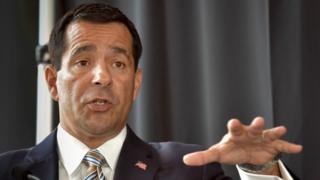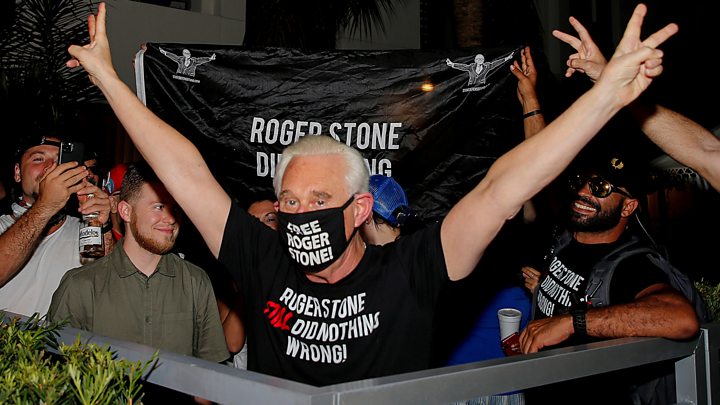 Image copyright
Getty Images
Image caption
William Evanina, Director of the National Counterintelligence and Security Center, warned of ongoing foreign interference in the vote
Image copyright
Getty Images
Image caption
William Evanina, Director of the National Counterintelligence and Security Center, warned of ongoing foreign interference in the vote
China, Russia and Iran are among countries seeking to influence the US presidential election this year, a top US intelligence chief has warned.
A statement issued by the director of US counterintelligence said foreign states are using "covert and overt influence measures" to sway the vote.
These nations "have a preference for who wins the election," it added.
US intelligence chiefs say that Russia interfered in the 2016 election to help President Donald Trump's campaign.
Russia has denied the allegations.
Asked at a press conference on Friday what he planned to do about the report on election interference, President Trump said his administration would look "very closely" into it.
The announcement comes amid claims by Mr Trump about the dangers of mail-in or postal ballots. He has suggested that the vote be delayed to prevent "the most inaccurate and fraudulent election in history", prompting a backlash even among members of his own party.
It also follows complaints by Democratic lawmakers that US intelligence agencies are not releasing information to the public about foreign interference in this year's vote.
The Republican president Mr Trump is seeking to win a second term in office. His challenger is Democratic candidate and former vice president Joe Biden.
What does the statement say?
William Evanina, head of the National Counterintelligence and Security Center (NCSC), released the statement on Friday.
Foreign countries are trying to sway voter preferences, change US policies, "increase discord" in the country "and undermine the American people's confidence in our democratic process", Mr Evanina said.
The counterintelligence chief however added that it would be "difficult for our adversaries to interfere with or manipulate voting results at scale."
Many countries "have a preference for who wins the election", he said, but the counterintelligence director said they were "primarily concerned" about China, Russia and Iran:
China "prefers that President Trump - whom Beijing sees as unpredictable - does not win reelection", the statement says, and has been "expanding its influence efforts" ahead of the vote Russia is seeking to "denigrate" Mr Biden's candidacy and other members of a perceived "anti-Russia 'establishment'". Mr Evanina added that some other actors linked to Russia "are also seeking to boost President Trump's candidacy on social media and Russian television" Iran is trying to "undermine US democratic institutions", Mr Trump, and "divide the country" ahead of the vote by spreading disinformation and "anti-US content" online. Their efforts are driven partially by a belief a second term for the president "would result in a continuation of US pressure on Iran in an effort to foment regime change"At Friday's press conference, Mr Trump said Russia "could be" meddling in this year's election, but dismissed the idea the country might be trying to help him win a second term. "I think the last person Russia wants to see in office is Donald Trump," he said, saying that "nobody's been tougher on Russia than I have, ever."
The release of the statement comes after members of the Democratic party voiced concern about attempts by foreign nations to influence the vote.
US House Speaker Nancy Pelosi on Wednesday said the intelligence about current efforts to sway the vote "should be available to the American people".
In his statement, Mr Evanina said his agency "has and will continue to provide classified election threat briefings" to candidates and politicians.
"The steps we have taken thus far to inform the public and other stakeholders on election threats are unprecedented for the IC [Intelligence community]."
What happened in 2016?
A number of US intelligence agencies and officials have concluded that Russia helped influence the 2016 presidential election.
Former FBI director Robert Mueller - appointed as a special counsel to investigate that vote - did not establish that Mr Trump colluded with that effort, but said the president was not exonerated by his report.
A number of people on Mr Trump's campaign have been jailed due to a variety of charges linked to Mr Mueller's investigation.
Charges against ex-National Security Adviser Michael Flynn - convicted of lying about contacts with Russian government officials - were dropped in July. An appeals court will rehear arguments later this month.
And Roger Stone, a long-time ally of Mr Trump, had his jail sentence for witness tampering and lying to Congress commuted the president in July.

Media playback is unsupported on your device

 5 years ago
627
5 years ago
627 

